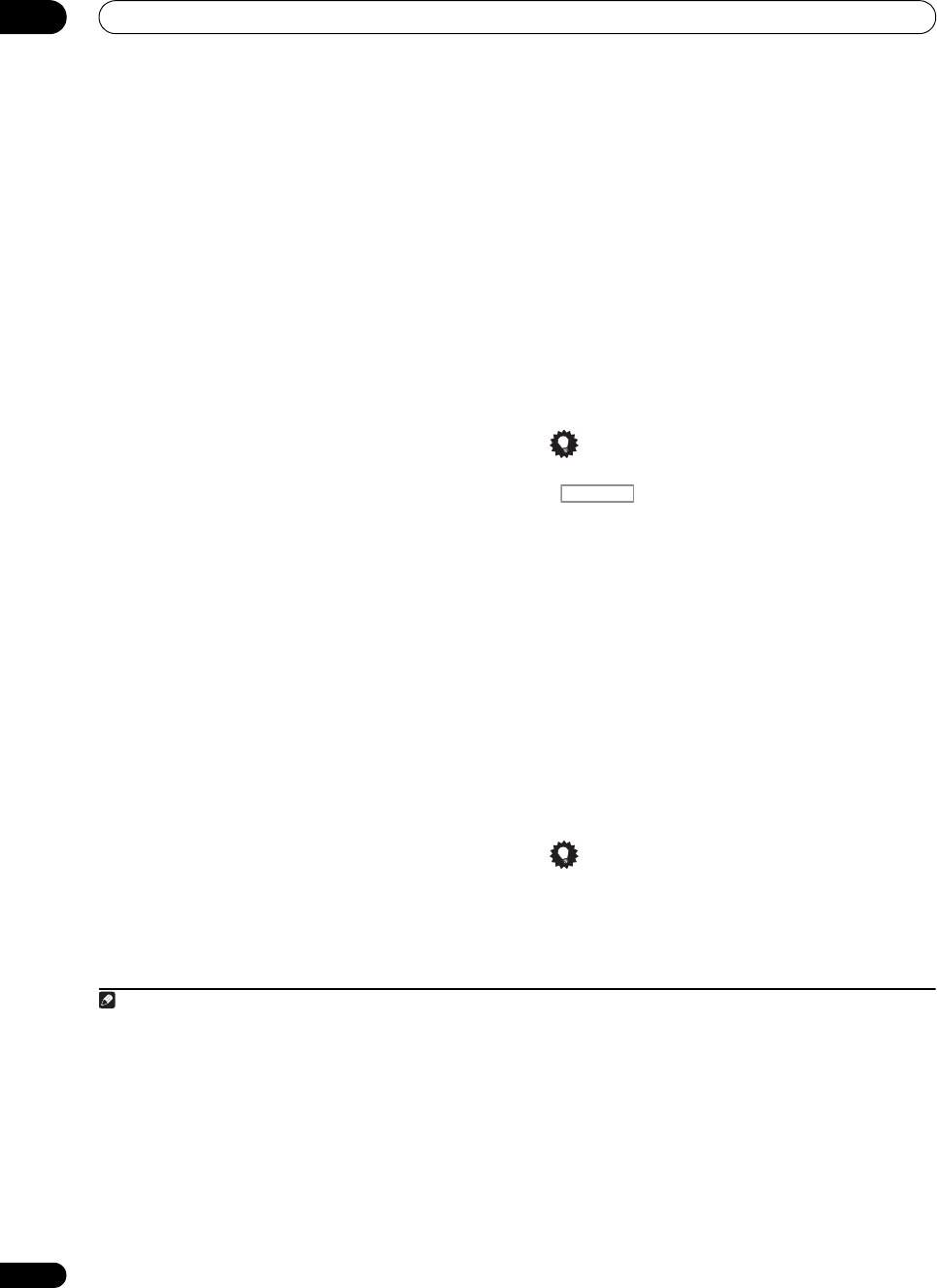
The System Setup and Other Setup menus
11
84
En
• Surr – Select LARGE if your surround speakers
reproduce bass frequencies effectively. Select
SMALL to send bass frequencies to the other
speakers or subwoofer. If you didn’t connect
surround speakers choose NO (the sound of the
surround channels is sent to the front speakers or a
subwoofer).
• SB – Select the number of surround back speakers
you have (one, two or none).
1
Select LARGEx2 or
LARGEx1 if your surround back speakers reproduce
bass frequencies effectively. Select SMALLx2 or
SMALLx1 to send bass frequencies to the other
speakers or subwoofer. If you didn’t connect
surround back speakers choose NO.
• SW – LFE signals and bass frequencies of channels
set to SMALL are output from the subwoofer when
YES is selected. Choose the PLUS setting if you want
the subwoofer to output bass sound continuously or
you want deeper bass (the bass frequencies that
would normally come out the front and center
speakers are also routed to the subwoofer).
2
If you did
not connect a subwoofer choose NO (the bass
frequencies are output from other speakers).
3 Select ‘
X. OVER
’ and set the crossover frequency.
3
Frequencies below this point will be sent to the
subwoofer (or LARGE speakers).
4 When you’re finished, press
RETURN
.
You will return to the Manual SP Setup menu.
Channel Level
Using the channel level settings, you can adjust the
overall balance of your speaker system, an important
factor when setting up a home theater system.
1 Select ‘
Channel Level
’ from the
Manual SP Setup
menu.
2 Select a setup option.
• MANUAL – Move the test tone manually from
speaker to speaker and adjust individual channel
levels.
• AUTO – Adjust channel levels as the test tone moves
from speaker to speaker automatically.
3 Confirm your selected setup option.
The test tones will start after you press ENTER.
4 Adjust the level of each channel using
/
.
If you selected MANUAL, use / to switch speakers.
The AUTO setup will output test tones in the order shown
on-screen:
Adjust the level of each speaker as the test tone is
emitted.
4
5 When you’re finished, press
RETURN
.
You will return to the Manual SP Setup menu.
Tip
• You can change the channel levels by press
, then press CH LEVEL, and then using /
on the remote control.
Speaker Distance
For good sound depth and separation from your system,
you need to specify the distance of your speakers from
the listening position. The receiver can then add the
proper delay needed for effective surround sound.
1 Select ‘
Speaker Distance
’ from the
Manual SP
Setup
menu.
2 Adjust the distance of each speaker using
/
.
You can adjust the distance of each speaker in
1
/2 inch
Increments.
3 When you’re finished, press
RETURN
.
You will return to the Manual SP Setup menu.
Tip
•For best surround sound, make sur e the surround
back speakers are the same distance from the
listening position.
Note
1 • If you selected ZONE 2 or Front Bi-Amp (in Speaker system setting on page 83) you can’t adjust the surround back settings.
• If the surround speakers are set to NO, the surround back speakers will automatically be set to NO.
2 If you have a subwoofer and like lots of bass, it may seem logical to select LARGE for your front speakers and PLUS for the subwoofer. This
may not, however, yield the best bass results. Depending on the speaker placement of your room you may actually experience a decrease in
the amount of bass due low frequency cancellations. In this case, try changing the position or direction of speakers. If you can’t get good
results, listen to the bass response with it set to PLUS and YES or the
front speake
rs set to LARGE and SMALL alternatively and let your ears
judge which sounds best. If you’re having problems, the easiest option is to route all the bass sounds to the subwoofer by selecting SMALL
for the front speakers.
3 • This setting decides the cutoff between bass sounds playing back from the speakers selected as LARGE, or the subwoofer, and bass sounds
playing back from those selected as SMALL. It also decides where the cutoff will be for bass sounds in the LFE channel.
• With Full Auto MCACC Setup or Auto MCACC Setup (ALL or Speaker Setting), the setting here will not apply and the crossover frequency
will be automatically set. Crossover frequency is a frequency aimed at achieving the optimal sound field taking into account the bass capacity
of all connected spea
kers and
human aural characteristics.
• If you’re using THX speakers, confirm that the crossover frequency is set to 80Hz.
4If you are using a Sound Pressure Level (SPL) meter, take the readings from your main listening position and adjust the level of each speaker
to 75 dB SPL (C-weighting/slow reading).
RECEIVER
VSX-33_UXJCB.book 84 ページ 2010年3月9日 火曜日 午前10時39分


















